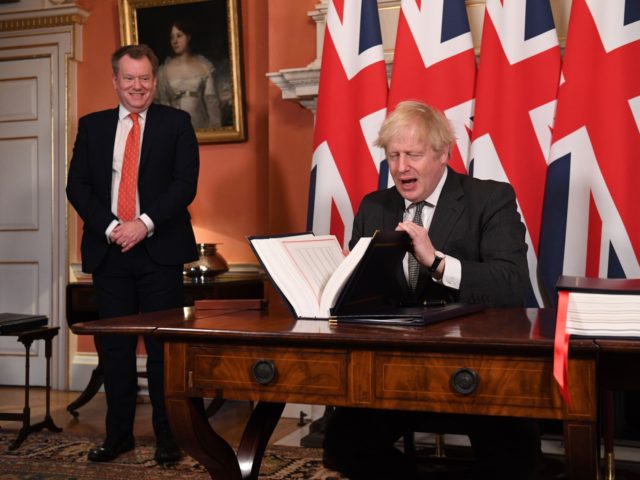Britain’s Minister for EU Relations has admitted Boris Johnson’s government is happy to let European Union law continue to apply in Northern Ireland for some purposes and keep an internal border between the British province and the rest of the United Kingdom for the EU’s sake.
Credited with getting “Brexit done” at the beginning of 2021 after years of delays and rearguard action against breaking with the European bloc by pro-EU politicians, Prime Minister Johnson did in fact make many major concessions to Brussels for a last-minute deal rather than countenance a clean “no-deal” exit.
These included selling out Britain’s fishermen, who had for decades watched their industry dwindle as the EU allocated the lion’s share of stocks in Britain’s territorial waters to foreign fleets, as well as allowing Brussels to cut out Gibraltar and the Falklands and accepting a multi-billion-pound “divorce bill” and a trade deal covering goods, where the EU has the advantage, but not services, where the UK had the advantage.
Reluctant to accept that Johnson had submitted to terms as humiliating as anything Theresa May had considered, or perhaps simply exhausted by the years of stalemate after their vote to Leave the European Union in 2016, few Brexiteers truly challenged the deal in its immediate aftermath, besides the once-again widely ignored fishermen — but it seems the Tories are no longer able to keep Brexit from the political forefront as their most humiliating concessions to the EU on Northern Ireland, also known as Ulster, have become impossible to ignore.
The British province, an integral part of the United Kingdom, was allowed to become something of an EU vassal state in order to keep the supposedly all-important open border with the European Union Ireland free of checks — which were instead shifted to the Irish Sea, with EU checks imposed on goods travelling from one part of the United Kingdom to another.
This has caused significant damage to intra-UK trade and caused shortages in Ulster, despite the system not even being fully implemented yet, as Brussels insists on imposing an especially draconian interpretation of the rules even on goods not intended to enter EU Ireland — indeed, the number of checks carried out at the Irish Sea seem out of all proportion to the number of checks to EU carries out at other borders it manages with countries including Russia, Turkey, and Morocco.
Ulster’s majority-unionist — that is, pro-union with Great Britain — population and their political representatives have been increasingly vocal in their opposition to the so-called Northern Ireland Protocol, with protests sometimes turning violent — but a supposedly tough speech by Johnson’s government minister for EU relations, former Brexit negotiation the Lord Frost, seems to envisage EU control continuing on in perpetuity.
Referencing proposed changes to the Protocol to make it less punishing for the United Kingdom, Frost stressed that the Johnson administration’s proposals “go with the grain of the Protocol. They do not remove it. They retain controls in the Irish Sea for certain purposes. They envisage that EU laws can still be valid, within certain circumstances, in Northern Ireland.”
For the avoidance of doubt, he then added that “Some would like us to sweep all the existing arrangements away. That is not our position. It is obvious there will always need to be a dedicated UK-EU Treaty relationship covering Northern Ireland,” suggesting that Brussels should be grateful to the British government for “accepting that another entity’s external border can be operated through the middle of our own country.”
“I am not sure that any country anywhere has done that,” he added, as if this should not be a matter of profound shame for a government led by a man who posed as a champion of national sovereignty during the EU referendum and Theresa May’s premiership.
Frost did warn the EU that failing to reform the Protocol would result in ongoing arguments and be “capable of generating a sort of cold mistrust between us and the EU which could spread across the relationship”, pleading for the bloc to agree changes and avoid “holding back the potential for a new era of cooperation between like-minded states in a world which needs us to work together effectively.”
All previous calls for the EU to change aspects of the Protocol having a negative impact on the UK have been rejected out of hand, however — and with the Tories having caved to them on everything from the “divorce bill” to fisheries to agreeing a trade deal that covers goods but not services, it seems unlikely they are about to start compromising out of an altruistic desire to help their former member-state out now.
Follow Jack Montgomery on Twitter: @JackBMontgomery
Follow Breitbart London on Facebook: Breitbart London

COMMENTS
Please let us know if you're having issues with commenting.